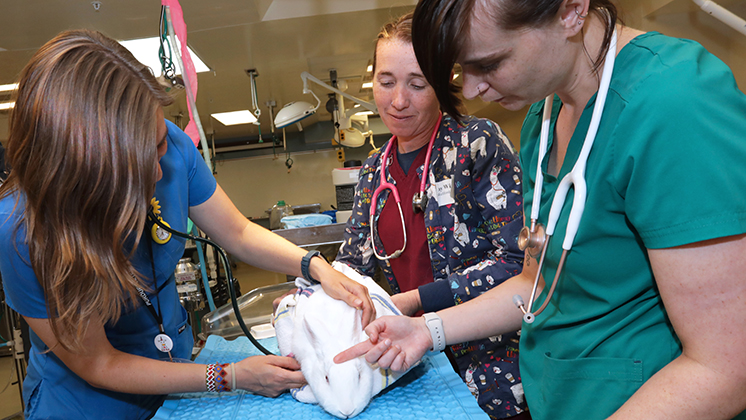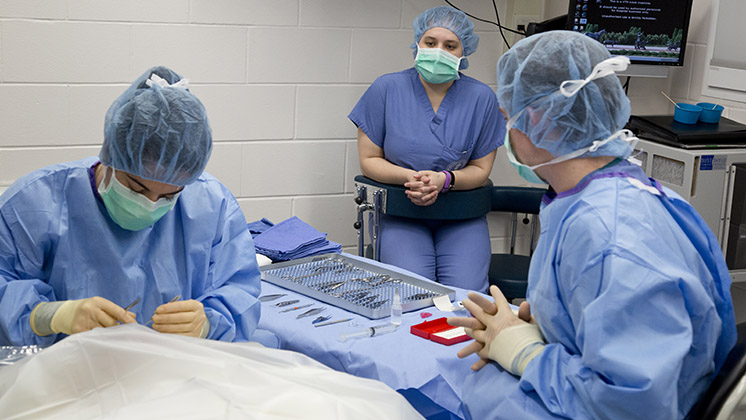How Do I Get a Vet Tech Job?

by Paige Allen, MS, RVT and Josh L. Clark, MS, RVT
Landing a job as a veterinary technician is an exciting milestone. It is the culmination of hard work, education, and practical training. Here's a step-by-step guide on how to get a vet tech job:
1. Obtain the Necessary Education
Once you have decided that this is the career for you, the next step to becoming a vet tech is to obtain the necessary education. This typically involves completing an Associate's degree or Bachelor’s degree from an institution accredited by the American Veterinary Medical Association (AVMA). You can locate accredited program information on the AVMA website. Your degree program will include hands-on experience in laboratory situations and clinical situations with patients and clients.
2. Pass the VTNE
Once you've completed your degree, you'll need to pass the Veterinary Technician National Exam (VTNE). Some states require additional exams or other requirements. You can check out your state’s requirements on the American Association of Veterinary State Boards (AAVSB) website.
3. Gain Practical Experience
Gaining additional practical experience can make you a more competitive candidate. It is a great idea to talk with a credentialed veterinary technician or DVM prior to applying to a program. It is important to have a good understanding of the job roles and responsibilities of a vet tech. Talk to your pet’s DVM about spending some time with them. Look for internships, volunteer opportunities, or part-time jobs in vet clinics, animal hospitals, or other relevant settings.
4. Craft a Strong Resume
Your resume is a critical tool in your job search. Make sure it's up-to-date and clearly highlights your education, certifications, practical experience, and any special skills or areas of expertise. It is important that each resume you send is tailored to the specific job. Avoid creating a generic resume that you send to multiple practices.
5. Write a Compelling Cover Letter
A good cover letter can set you apart from other candidates. This is an opportunity to provide specific information that will set you apart from other candidates. For example, if you are fluent in another language, highlight it in your letter. Express your interest in the specific role or clinic, and any relevant achievements or experiences.
6. Apply for Jobs
As you start applying for jobs, you can find job postings on online job boards, professional organizations' websites, or social media. Don't forget to tap into your network, too - let your classmates, professors, and internship supervisors know you're looking for a job.
7. Prepare for Interviews
Once you start getting interview calls, make sure you're prepared. Research common vet tech interview questions and practice your answers. Also, do some research on the clinic or organization to which you're applying, so you can tailor your responses and ask thoughtful questions.
8. Follow Up
After an interview, always send a thank you note or email expressing your appreciation for the opportunity. This can help you stand out and shows your enthusiasm for the role.
9. Negotiate Your Offer
If you receive a job offer, take the time to evaluate it. Make sure you understand the salary, benefits, hours, responsibilities, and opportunities for professional growth. Don't be afraid to negotiate if you feel the offer could be improved.
Securing a vet tech job involves a combination of solid education, professional certification, practical experience, and effective job search strategies. With perseverance and commitment, you can find a role that not only empowers you to work at your full potential but also fulfills your passion for animal care.
Start Your Veterinary Technician Journey
Find your calling as a Purdue Veterinary Technician!
Not quite ready to apply? Connect with us to learn more.
Suggested Articles

What is the Difference Between a Vet Tech and a Vet Assistant?
Delve into the distinct roles of veterinary technicians and veterinary assistants in animal healthcare. Highlighting differences in education, job duties, scope of practice, and compensation, this guide offers a clear comparison to help aspiring professionals choose their best-fit career path in veterinary medicine.
Read more
Can I Get Financial Assistance for Vet Tech/Nursing School?
Explore scholarships, federal aid, and veterinary partnerships as invaluable resources to afford vet tech school tuition and overcome financial challenges in pursuing a veterinary technician career.
Read more
How to Increase Your Earning Potential as a Vet Tech
Learn how to boost your earning potential as a Veterinary Technician (Vet Tech) with our comprehensive guide. Discover the benefits of specializing in specific areas, gaining experience, furthering your education, and more.
Read more
